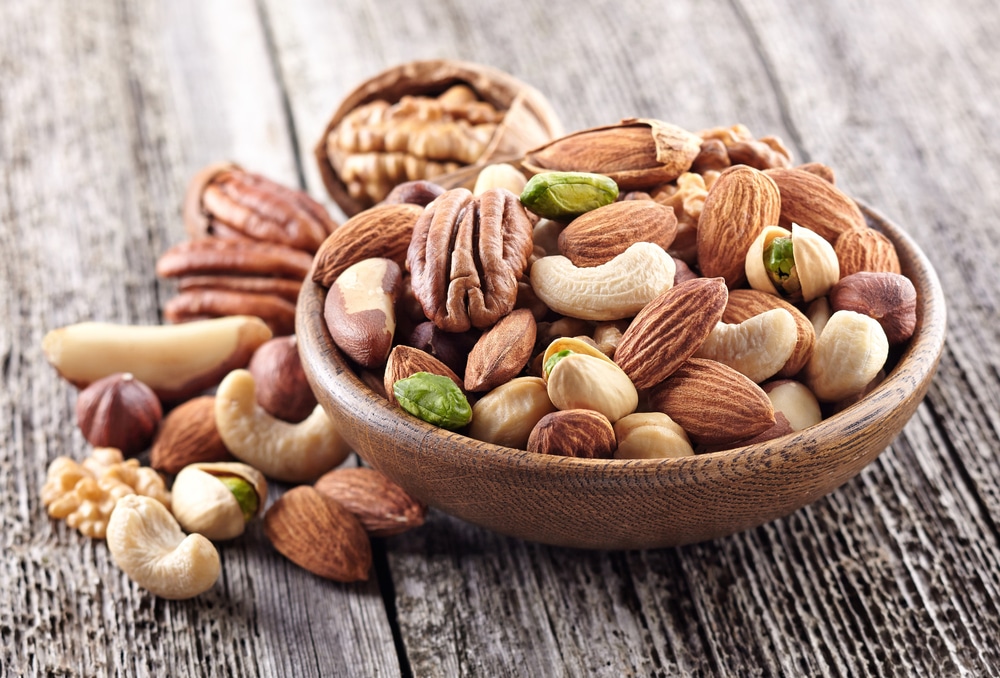Nuts are packed with protein and healthy fats, both of which play a role in our diets. From an outsider’s perspective, nuts might seem like the perfect snack option for your dog. If you allot 10 percent of your dog’s diet towards treats, it is better to steer clear of these snacks. While some nuts are safe for dogs, others can pose a serious threat. However, can dogs eat nuts?
Dogs should not eat nuts as they can be tough for them to process and cause toxicity if given in large amounts. While some nuts are safe for dogs, such as cashews, chestnuts, and peanuts, others can be more harmful. Almonds, brazil nuts, hazelnuts, macadamia nuts, walnuts, and pecans contain substances that can be toxic to dogs if consumed in large quantities. It is best to avoid giving your dog any type of nut as a snack. If you must give them a nut, make sure to do so in moderation and keep an eye out for any adverse reactions.
Table of Contents
Which Nuts Are Safe for Dogs to Eat?

There are many types of nuts that are safe for dogs to eat to some extent, but you must read the following facts before giving them to your pup.
1. Cashews
These nuts are often enjoyed by humans as a snack food. Cashews are a great source of protein, fiber, and healthy fats. While cashews are not poisonous to dogs, they are recommended in moderate quantities for them. This is because cashews contain high levels of oil and fat, which can cause gastrointestinal upset in dogs.
2. Chestnuts
These are a type of nut that is typically roasted before being eaten. Chestnuts can be a healthy treat for your dog. They are a good source of fiber, which can help with digestion. They are also low in calories and fat, making them a good choice for dogs who are overweight or have diabetes.
Chestnuts contain vitamins C as well as minerals like iron, potassium, and magnesium. Giving your dog chestnuts can help them stay healthy and fit. Be sure to introduce them slowly to avoid any digestive issues.
3. Peanuts
Did you know peanuts are not just a delicious snack for humans, but they can also be beneficial for dogs? Peanuts are a good source of protein and essential vitamins and minerals, and they can help control blood pressure and help prevent heart diseases.
Peanuts are also low in saturated fat and cholesterol, making them a healthy snack choice. If you give your dog peanuts, make sure they are unsalted and shelled.
Can Dogs Eat Peanut Butter?
Yes, dogs can eat peanut butter as long as it is natural and unsweetened. Peanut butter is a good source of protein and healthy fats for dogs. However, some dogs may be allergic to peanuts, so it’s important to monitor your dog’s reaction to peanut butter before feeding it to them regularly. Your vet may also be able to perform an allergy test.
Nuts That Are Toxic to Dogs
Although many nuts are beneficial for dogs, that doesn’t mean every variety of the nut family will be. In short, some nuts are toxic to dogs. Let’s have a closer look at the ones that are.
1. Almonds
Almonds are a popular type of nut, but they can be toxic to dogs. The toxicity is caused by a chemical called amygdalin, which is found in almond skin. When the skin is ingested, it breaks down into cyanide, which can be deadly.
Symptoms of almond toxicity include vomiting, diarrhea, difficulty breathing, and collapse. If you think your dog has eaten any almonds, contact your veterinarian immediately.
2. Brazil Nuts
Although brazil nuts are good and a part of a healthy diet, are they safe for dogs to eat? The answer is “No.” Brazil nuts are rich in fats that can lead to weight gain and other health problems for dogs. Their salty flavor is also unfavorable to dogs’ health.
They also contain a substance called selenium, which is toxic to dogs in large amounts. So, it’s best to avoid giving your dog brazil nuts as a treat or snack.
3. Hazelnuts
No matter how much you love your dog, you shouldn’t give them hazelnuts. Some of the potential hazards of feeding hazelnuts to dogs include gastrointestinal upset, choking, blockages, and toxicity.
Given the potential risks, it’s best to avoid giving hazelnuts to dogs altogether. If you think your dog has eaten a hazelnut, contact your veterinarian immediately. They can help you determine if your pet is at risk and take steps to ensure their safety.
4. Macadamia Nuts
Macadamia nuts are poisonous to dogs and can cause a range of symptoms including weakness in the legs, vomiting, diarrhea, fever, and shivering. The exact substance in the nuts that causes toxicity is unknown, but all symptoms can be severe.
In severe cases, this can even lead to death. Dogs that have eaten macadamia nuts should be monitored closely, and you’ll want to seek medical attention for them if any symptoms develop.
5. Walnuts
Walnuts are not considered an ideal diet for dogs. They contain high levels of fat, which can cause pancreatitis in dogs. Moreover, the outer shell of walnuts can be toxic to dogs and can cause gastrointestinal blockage.
It can also cause abdominal pain, dehydration, and seizures. Lastly, some dogs can be allergic to walnuts, which can cause itching, swelling, and vomiting. Therefore, it is best to avoid feeding walnuts to dogs.
6. Pecans
Pecans can be a choking hazard for dogs. Additionally, pecans contain a lot of fat and calories, which can lead to weight gain and other health problems for your dog. Aflatoxin in pecans can cause liver damage in dogs, and the omega-6 fatty acids can lead to inflammation.
Shells of pecans can be dangerous for dogs if ingested, as they can cause gastrointestinal blockages. Pecans are best avoided as a treat for your pooch!
Why Are Nuts Bad For Dogs?
Nuts are generally considered to be unhealthy for dogs because of the potential for them to choke on them and because they can contain harmful toxins.
Some nuts, such as almonds, can also cause gastrointestinal problems in dogs. In general, it is best to avoid giving your dog any nuts as part of its diet.
Nuts Are High In Calories And Can Cause Weight Gain
Nuts are a high-calorie food and, as such, can contribute to weight gain in dogs. While they are not necessarily “bad” for dogs, they should be given in moderation. When giving your dog nuts, it is important to monitor their calorie intake and make sure they are not consuming too many calories overall.
Nuts Have High-Fat Content That Can Cause Pancreatitis
Nuts are a common food for humans, but they can be dangerous for dogs. They have high-fat content that can cause pancreatitis, an inflammation of the pancreas. Pancreatitis can be deadly for dogs, so it’s important to keep them away from nuts.
Nuts Can Have Coatings That Are Dangerous for Dogs
Nuts can be dangerous for dogs if they are coated with aflatoxin or juglone. These substances can cause gastrointestinal upset or even be fatal. Always check with your vet before feeding your dog any nuts.
Symptoms Of Nut Toxicity In Dogs
The most common symptoms of nut toxicity in dogs include:
- Vomiting
- Diarrhea
- Abdominal pain
- rolling
- lack of appetite
- Lethargy
- Weakness
- Seizures and death may occur in severe cases
So, if your dog displays any of these symptoms, it is important to seek veterinary care immediately. If treated early, most dogs will recover without any lasting effects. However, if left untreated, nut toxicity can be fatal. You could also contact Animal Poison Control if your vet is unavailable or if an emergency vet is too far away.
In Conclusion: Can Dogs Eat Nuts?
Dogs can eat some nuts, but it’s important to be aware of the risks associated with giving them too many. Some beneficial nuts for dogs include cashews, chestnuts, and peanuts. However, it’s best to avoid feeding your dog almonds, brazil nuts, hazelnuts, macadamia nuts, walnuts, and pecans due to the risk of toxicity. So, if your dog does eat any of these nuts, it’s important to monitor them for symptoms and seek medical attention if any develop.
So, what about you? Have you ever given your dog nuts? What kind of reaction did they have? Let us know in the comments below!
